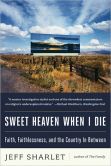By Jeff Sharlet
W. W. Norton & Company, $15.95, 264 pages
Sweet Heaven When I Die is about how faith, religious or otherwise, informs the lives and work of individual people. Sharlet moves without apparent effort from high culture— the controversial activist/philosopher Cornel West— to media culture, to the militant Christian fundamentalism of Ron Luce’s BattleCry youth crusade. He is at home with those ardent BattleCry teenagers, with radio broadcast licensing executives, and with Chava Rosenfarb, a concentration camp survivor who writes prolifically in Yiddish. Many of his subjects hold or struggle with overtly religious faith . . . or with doubt. But for others like Brad Will, the self-styled anarchist who captured injustice– and his own death, at age 36– on video tape, their faith is secular, focused on social issues.
“I’m not a seeker, she said, I’m a doubter. Doubt…is not unbelief, it is in between. That’s my niche, Sondra/Jesus whispered, my place in the chain of supply and demand. “Doubt,” she said, “is your revelation.”
The music, depth of insight, and compassion of Sharlet’s prose are a delight. In the opening essay Sharlet moves easily between the landscape, colorful locals, and his memories of and visit with a former girlfriend who continues to study the Bible for its insights long after her Christian faith has softened and faded.
In Sweet Heaven When I Die we see more faith than faithlessness, and a considerable portion of the country in between.
Reviewed by Daniel Hobbs
[amazon asin=0393344231&text=Buy On Amazon][amazon asin=0393344231&text=Buy On Amazon&template=carousel]

